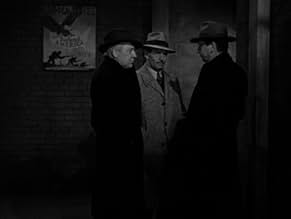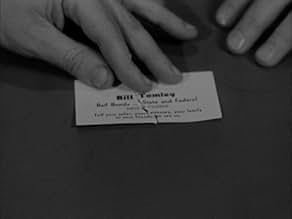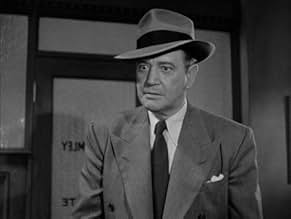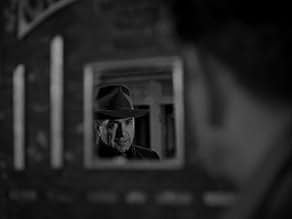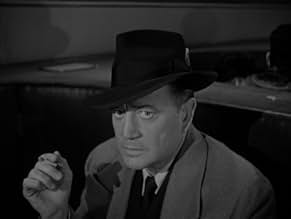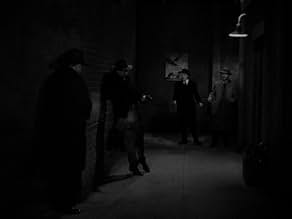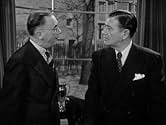NOTE IMDb
6,3/10
1,3 k
MA NOTE
Ajouter une intrigue dans votre langueA depressed man hires an assassin to kill him when he least expects it, but when his life takes an upward turn, he finds he now wishes to live.A depressed man hires an assassin to kill him when he least expects it, but when his life takes an upward turn, he finds he now wishes to live.A depressed man hires an assassin to kill him when he least expects it, but when his life takes an upward turn, he finds he now wishes to live.
- Réalisation
- Scénario
- Casting principal
Trevor Bardette
- The Bum in the Next Bed
- (non crédité)
William 'Billy' Benedict
- The Deafmute
- (non crédité)
Willie Bloom
- Bum
- (non crédité)
Roy Brent
- Detective in Alley
- (non crédité)
Charles Coleman
- Jennings the Butler
- (non crédité)
Clancy Cooper
- Telephone Repairman
- (non crédité)
Don Costello
- Lefty Vigran aka Gorss
- (non crédité)
Russell Custer
- Bar Patron
- (non crédité)
Ralph Dunn
- Cop at Car Accident
- (non crédité)
Otto Forrest
- The Whistler
- (non crédité)
Byron Foulger
- Flophouse Desk Clerk
- (non crédité)
John George
- Bum
- (non crédité)
Dick Gordon
- Tomley's Assistant
- (non crédité)
Robert Homans
- Dock Watchman
- (non crédité)
Avis à la une
Before he became a producer and conjured up all those publicity gimmicks for his cheesy horror pictures, William Castle churned out a series of nifty little pictures as a director for Harry Cohn's B unit -- including the immortal "When Strangers Marry". "The Whistler" is a clever noir that tackles the old premise of a despondent man hiring a contract killer to murder him, only to change his mind later. Castle provides a higher standard of mise-en-scene than in most pictures of this ilk, with nice camera movement and grungy, realistic sets. The absurd plot twists and lapses of logic stretch credulity to the utmost -- but that's one of the "beatitudes of the B's" (as Andrew Sarris would say). It's surprising that Cornell Woolrich was not the original author, so close is the atmosphere to his oeuvre. Dix is a bit of a cipher, but Naish is as compelling as always in another offbeat role as the philosophical hit man who suffers from fear of death; plus there are plenty of familiar faces in minor roles. The mysterious omniscient Whistler narrator is effective, if somewhat underused here. Castle went on to direct two even better entries in the series.
This first Whistler film, unlike the others, has recognizable supporting players in the cast besides Richard Dix at the center of the story who plays a different character with different problems in every film. This supporting cast includes J. Carrol Naish as the hired killer, Gloria Stuart as Alice Walker, the main character's secretary, and Alan Dinehart as the shady friend of the hired killer.
In this first installment Richard Dix plays industrialist Earl C. Conrad. It is explained that Conrad's marriage was in trouble so the couple went on a cruise. But Conrad's wife was lost at sea, and all of his friends ostracized him when he came back alone, thinking that he might have killed her to get rid of her. Three years of this and Conrad decides to kill himself but doesn't have the nerve to do it himself. So he hires a hitman to do it for him. He has contact with the middleman who arranges the hit, but will have no idea where or when or by whom his death will take place.
But then a telegraph comes telling Conrad that his wife has been found in a Japanese internment camp, and that the International Red Cross will be transporting her home. Now Conrad will not only have his wife back but will be exonerated among his friends. Thus he thinks life will be worth living again. But in the interim, the middleman who arranged the hit has been killed in a shootout with the police, so he has no way to call the thing off.
And most unfortunately , for the hitman this is not just business. He likes to read criminology books and wants to see if he can scare Conrad to death by making himself seen so Conrad knows he's being stalked.
Most of The Whistler movies have lots of twists and irony in them. This is just one long manhunt/chase scene after the first fifteen minutes with nothing special about it. Although Naish as the hitman is effectively creepy. Also different about this first Whistler film - The Whistler's whistling actually enters into the plot.
In this first installment Richard Dix plays industrialist Earl C. Conrad. It is explained that Conrad's marriage was in trouble so the couple went on a cruise. But Conrad's wife was lost at sea, and all of his friends ostracized him when he came back alone, thinking that he might have killed her to get rid of her. Three years of this and Conrad decides to kill himself but doesn't have the nerve to do it himself. So he hires a hitman to do it for him. He has contact with the middleman who arranges the hit, but will have no idea where or when or by whom his death will take place.
But then a telegraph comes telling Conrad that his wife has been found in a Japanese internment camp, and that the International Red Cross will be transporting her home. Now Conrad will not only have his wife back but will be exonerated among his friends. Thus he thinks life will be worth living again. But in the interim, the middleman who arranged the hit has been killed in a shootout with the police, so he has no way to call the thing off.
And most unfortunately , for the hitman this is not just business. He likes to read criminology books and wants to see if he can scare Conrad to death by making himself seen so Conrad knows he's being stalked.
Most of The Whistler movies have lots of twists and irony in them. This is just one long manhunt/chase scene after the first fifteen minutes with nothing special about it. Although Naish as the hitman is effectively creepy. Also different about this first Whistler film - The Whistler's whistling actually enters into the plot.
I watched this last night on TCM and found it not only thoroughly entertaining but a textbook example of how a B-grade picture from a poverty row studio could rise above its budget limitations thanks to the efforts of a clever director (William Castle) and strong players (Richard Dix and J. Carroll Naish in particular). Superior in some respects to entries in parallel series based on radio programs (like Universal's Inner Sanctum with Lon Chaney, Jr.), perhaps the most appealing aspect of "The Whistler" is the economy with which the story is told. There are no needless lines, no needless scenes. Whether it belongs within the "noir" cycle is a matter to be debated, but nevertheless "The Whistler" has its share of the quirky characters and shadowy settings that typify that genre, not to mention the creepy portrayal by Naish of a hit-man who reads a monograph on "necrophobia" in his spare time.
Whistler, The (1944)
** 1/2 (out of 4)
First film in Columbia's series has Richard Dix playing a man wanting to commit suicide due to the death of his wife but he doesn't have the courage to do so. Wanting to die, Dix hires a killer (J. Carrol Naish) to do the job but then he learns that his wife is still alive so he too must try and stay alive. Based on a radio show, this first film is actually pretty entertaining due to some nice direction by Castle and the two leads turning in fine performances. The story itself is pretty interesting and the B-budget gets all out of it that it can. Dix makes for a very good leading man and his performance is very good especially during his depression scenes. Naish is a great character actor and makes for a very good killer. Gloria Stuart plays Dix secretary and does nice work, although she has the weakest character.
** 1/2 (out of 4)
First film in Columbia's series has Richard Dix playing a man wanting to commit suicide due to the death of his wife but he doesn't have the courage to do so. Wanting to die, Dix hires a killer (J. Carrol Naish) to do the job but then he learns that his wife is still alive so he too must try and stay alive. Based on a radio show, this first film is actually pretty entertaining due to some nice direction by Castle and the two leads turning in fine performances. The story itself is pretty interesting and the B-budget gets all out of it that it can. Dix makes for a very good leading man and his performance is very good especially during his depression scenes. Naish is a great character actor and makes for a very good killer. Gloria Stuart plays Dix secretary and does nice work, although she has the weakest character.
This movie is the first installment of The Whistler series from Columbia Pictures, all but one of which starred Richard Dix whose A-picture career was then on an alcoholic downgrade, but whose liquor-ravaged face was just right for the overall atmosphere. (For a complete list of series titles, consult "movie connections" on web page.) Of all the movie series to emerge from the 30's and 40's, this is easily one of the most fascinating and unusual. Each entry presents a different self-contained story, tied together only by the mysterious figure of The Whistler who comments briefly on plot developments, but appears only in shadow to whistle his trademark refrain. He seems to be a figure of fate since the hand of destiny emerges in most of the entries. But most importantly, the plots follow no formula (unusual for any series) and are entirely unpredictable in their outcome. This unpredictability is what distinguishes the series from others of the time.You really don't know what's going to happen or how each episode will turn out. Moreover, there's a strong noirish quality to many of the entries, with a suspenseful atmosphere, an underlying sense of doom, and imaginative characters and plot twists. All in all, the productions are a first cousin to the celebrated Val Lewton horror cycle from RKO, minus the supernatural. I'm surprised that with all the scholarly interest in film noir, that this noirish series has not received the critical attention it merits.
Though weaker in many ways (the script appears put together on the fly), this initial entry contains many features generic to the others. Dix, a prosperous manufacturer, arranges for his own death following the presumed death of his beloved wife, only to find out ironically that she is not dead. The problem is he can't undo the arrangement and is thus forced to escape through the labyrinthine venues of the city's skid row. The entire 60 minutes has something of a nightmarish quality since it starts off with Dix expecting death, though in what form, he can't be sure. Looking convincingly like a real bum, it's Dix's tour through the seedy parts of the city that really commands attention, especially the 25-cent flop-house with its rows of coffin-like cots, snoring vagrants, and sneak thief. You can almost smell the rot-gut whiskey peeling off the walls. The sets are bare-bones, the cafes, bars, and city sidewalks sometimes suggesting the unadorned depths of urban despair. Unfortunately, the ending is abrupt and disappointing. It's almost as though the production suddenly ran out of film and had to wrap it up right then. Nonetheless, many of the distinctive elements of the productions are already present. Unfortunately copies of the series are hard to obtain ( my own burned in a house fire some time ago). So let's hope our friends on cable TV follow up on this initial entry some time soon. It's well worth tuning in.
Though weaker in many ways (the script appears put together on the fly), this initial entry contains many features generic to the others. Dix, a prosperous manufacturer, arranges for his own death following the presumed death of his beloved wife, only to find out ironically that she is not dead. The problem is he can't undo the arrangement and is thus forced to escape through the labyrinthine venues of the city's skid row. The entire 60 minutes has something of a nightmarish quality since it starts off with Dix expecting death, though in what form, he can't be sure. Looking convincingly like a real bum, it's Dix's tour through the seedy parts of the city that really commands attention, especially the 25-cent flop-house with its rows of coffin-like cots, snoring vagrants, and sneak thief. You can almost smell the rot-gut whiskey peeling off the walls. The sets are bare-bones, the cafes, bars, and city sidewalks sometimes suggesting the unadorned depths of urban despair. Unfortunately, the ending is abrupt and disappointing. It's almost as though the production suddenly ran out of film and had to wrap it up right then. Nonetheless, many of the distinctive elements of the productions are already present. Unfortunately copies of the series are hard to obtain ( my own burned in a house fire some time ago). So let's hope our friends on cable TV follow up on this initial entry some time soon. It's well worth tuning in.
Le saviez-vous
- AnecdotesFirst of eight entries in the "Whistler" series, released from 1944 to 1948, and Richard Dix appeared in all but the last one. Unusually, he played a different character in each.
- GaffesWhile the killer is lying on the bed perusing his book on Fear of Death, a cigarette suddenly appears in his mouth.
- Citations
The Bum in the Next Bed: Rats in this place as big as beavers. They won't hurt ya... but you're liable to trip over them in the dark.
- ConnexionsFeatured in Spine Tingler! The William Castle Story (2007)
Meilleurs choix
Connectez-vous pour évaluer et suivre la liste de favoris afin de recevoir des recommandations personnalisées
Détails
- Date de sortie
- Pays d’origine
- Langue
- Aussi connu sous le nom de
- Der Whistler
- Lieux de tournage
- Société de production
- Voir plus de crédits d'entreprise sur IMDbPro
- Durée59 minutes
- Couleur
- Rapport de forme
- 1.37 : 1
Contribuer à cette page
Suggérer une modification ou ajouter du contenu manquant

Lacune principale
By what name was The Whistler (1944) officially released in India in English?
Répondre
